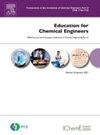在高级化学工程实验课程中,透过工业角色扮演,强化工程师身份及沟通技巧
IF 2.3
2区 教育学
Q1 EDUCATION, SCIENTIFIC DISCIPLINES
引用次数: 0
摘要
在工程教育中,弥合理论知识和实践技能之间的差距对于为学生未来的职业生涯做好准备至关重要,然而,传统的实验课程往往是公式化的,与现实世界的应用脱节。本文介绍了蒙大拿州立大学重新设计的高级化学工程实验室课程序列,该课程结合了角色扮演和行业相关的场景,以提高学生的参与度和学习成果。讲师扮演“管理者”的角色,而学生则成为虚拟公司的“实习生”和“试用员工”,他们需要完成实验并向不同的客户报告结果。通过模拟专业的工程环境,学生可以将实验室与未来的工业任务联系起来,从而激励他们提高技术沟通、团队合作和解决问题的能力。课程设计涉及与行业代表的合作,并以社会学习、体验学习和情境学习理论为基础。初步反馈表明,学生们发现这门课程与他们的职业更相关,感觉更投入,并培养了更强的工程师身份。这项工作为工程教育中创新教学方法的文献做出了贡献,并为旨在提高课程相关性和有效性的教育工作者提供了实用建议。本文章由计算机程序翻译,如有差异,请以英文原文为准。
Strengthening engineering identity and communication skills through industrial role-playing in a senior chemical engineering laboratory course
In engineering education, bridging the gap between theoretical knowledge and practical skills is crucial for preparing students for their future careers, however, traditional laboratory courses tend to be formulaic and disconnected from real-world applications. This paper presents a redesigned senior-level chemical engineering laboratory course sequence at Montana State University that incorporates role-playing and industry-relevant scenarios to enhance student engagement and learning outcomes. Instructors take the role of “management” while the students become “interns” and “probationary employees” at fictional companies that need to complete experiments and report results to different clientele. By simulating a professional engineering environment, students can relate labs to future industry tasks, thereby motivating them to improve their technical communication, teamwork, and problem-solving skills. The course design involved collaboration with industry representatives and was grounded in social learning, experiential learning, and situated learning theories. Preliminary feedback indicated that students found the course more relevant to their careers, felt more engaged, and developed a stronger engineering identity. This work contributes to the literature on innovative teaching methods in engineering education and offers practical recommendations for educators aiming to enhance the relevance and effectiveness of their courses.
求助全文
通过发布文献求助,成功后即可免费获取论文全文。
去求助
来源期刊

Education for Chemical Engineers
Multiple-
CiteScore
8.80
自引率
17.90%
发文量
30
审稿时长
31 days
期刊介绍:
Education for Chemical Engineers was launched in 2006 with a remit to publisheducation research papers, resource reviews and teaching and learning notes. ECE is targeted at chemical engineering academics and educators, discussing the ongoingchanges and development in chemical engineering education. This international title publishes papers from around the world, creating a global network of chemical engineering academics. Papers demonstrating how educational research results can be applied to chemical engineering education are particularly welcome, as are the accounts of research work that brings new perspectives to established principles, highlighting unsolved problems or indicating direction for future research relevant to chemical engineering education. Core topic areas: -Assessment- Accreditation- Curriculum development and transformation- Design- Diversity- Distance education-- E-learning Entrepreneurship programs- Industry-academic linkages- Benchmarking- Lifelong learning- Multidisciplinary programs- Outreach from kindergarten to high school programs- Student recruitment and retention and transition programs- New technology- Problem-based learning- Social responsibility and professionalism- Teamwork- Web-based learning
 求助内容:
求助内容: 应助结果提醒方式:
应助结果提醒方式:


